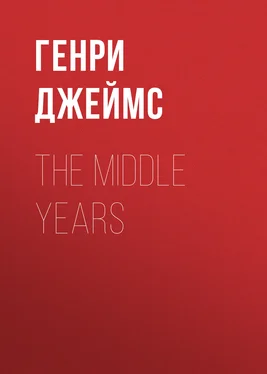Генри Джеймс - The Middle Years
Здесь есть возможность читать онлайн «Генри Джеймс - The Middle Years» — ознакомительный отрывок электронной книги совершенно бесплатно, а после прочтения отрывка купить полную версию. В некоторых случаях можно слушать аудио, скачать через торрент в формате fb2 и присутствует краткое содержание. Жанр: Биографии и Мемуары, foreign_antique, на английском языке. Описание произведения, (предисловие) а так же отзывы посетителей доступны на портале библиотеки ЛибКат.
- Название:The Middle Years
- Автор:
- Жанр:
- Год:неизвестен
- ISBN:нет данных
- Рейтинг книги:5 / 5. Голосов: 1
-
Избранное:Добавить в избранное
- Отзывы:
-
Ваша оценка:
- 100
- 1
- 2
- 3
- 4
- 5
The Middle Years: краткое содержание, описание и аннотация
Предлагаем к чтению аннотацию, описание, краткое содержание или предисловие (зависит от того, что написал сам автор книги «The Middle Years»). Если вы не нашли необходимую информацию о книге — напишите в комментариях, мы постараемся отыскать её.
The Middle Years — читать онлайн ознакомительный отрывок
Ниже представлен текст книги, разбитый по страницам. Система сохранения места последней прочитанной страницы, позволяет с удобством читать онлайн бесплатно книгу «The Middle Years», без необходимости каждый раз заново искать на чём Вы остановились. Поставьте закладку, и сможете в любой момент перейти на страницу, на которой закончили чтение.
Интервал:
Закладка:
Henry James
The Middle Years
EDITOR'S NOTE
The following pages represent all that Henry James lived to write of a volume of autobiographical reminiscences to which he had given the name of one of his own short stories , The Middle Years. It was designed to follow on Notes of a Son and Brother and to extend to about the same length. The chapters here printed were dictated during the autumn of 1914. They were laid aside for other work toward the end of the year and were not revised by the author. A few quite evident slips have been corrected and the marking of the paragraphs—which he usually deferred till the final revision—has been completed.
In dictating The Middle Years he used no notes, and beyond an allusion or two in the unfinished volume itself there is no indication of the course which the book would have taken or the precise period it was intended to cover .
PERCY LUBBOCK.I
If the author of this meandering record has noted elsewhere 1 1 "Notes of a Son and Brother," 1914.
that an event occurring early in 1870 was to mark the end of his youth, he is moved here at once to qualify in one or two respects that emphasis. Everything depends in such a view on what one means by one's youth—so shifting a consciousness is this, and so related at the same time to many different matters. We are never old, that is we never cease easily to be young, for all life at the same time: youth is an army, the whole battalion of our faculties and our freshnesses, our passions and our illusions, on a considerably reluctant march into the enemy's country, the country of the general lost freshness; and I think it throws out at least as many stragglers behind as skirmishers ahead—stragglers who often catch up but belatedly with the main body, and even in many a case never catch up at all. Or under another figure it is a book in several volumes, and even at this a mere instalment of the large library of life, with a volume here and there closing, as something in the clap of its covers may assure us, while another remains either completely agape or kept open by a fond finger thrust in between the leaves. A volume, and a most substantial, had felt its pages very gravely pressed together before the winter's end that I have spoken of, but a restriction may still bear, and blessedly enough, as I gather from memory, on my sense of the whole year then terminated—a year seen by me now in the light of agitations, explorations, initiations (I scarce know how endearingly enough to name them!) which I should call fairly infantine in their indifference to proportions and aims, had they not still more left with me effects and possessions that even yet lend themselves to estimation.
It was at any rate impossible to have been younger, in spite of whatever inevitable submissions to the rather violent push forward at certain particular points and on lines corresponding with them, than I found myself, from the first day of March 1869, in the face of an opportunity that affected me then and there as the happiest, the most interesting, the most alluring and beguiling, that could ever have opened before a somewhat disabled young man who was about to complete his twenty-sixth year. Treasures of susceptibility, treasures not only unconscious of the remotest approach to exhaustion, but, given the dazzling possibilities, positively and ideally intact, I now recognise—I in fact long ago recognised—on the part of that intensely "reacting" small organism; which couldn't have been in higher spirits or made more inward fuss about the matter if it had come into a property measured not by mere impressions and visions, occasions for play of perception and imagination, mind and soul, but by dollars and "shares," lands and houses or flocks and herds. It is to the account of that immense fantastication that I set down a state of mind so out of proportion to anything it could point to round about save by the vaguest of foolish-looking gestures; and it would perhaps in truth be hard to say whether in the mixture of spirit and sense so determined the fact of innocence or that of intelligence most prevailed. I like to recover this really prodigious flush—as my reader, clearly, must perceive I do; I like fairly to hang about a particular small hour of that momentous March day—which I have glanced at too, I believe, on some other and less separated page than this—for the sake of the extraordinary gage of experience that it seemed on the spot to offer, and that I had but to take straight up: my life, on so complacently near a view as I now treat myself to, having veritably consisted but in the prolongation of that act. I took up the gage, and as I look back the fullest as well as simplest account of the interval till now strikes me as being that I have never, in common honour, let it drop again. And the small hour was just that of my having landed at Liverpool in the gusty, cloudy, overwhelmingly English morning and pursued, with immediate intensities of appreciation, as I may call the muffled accompaniment for fear of almost indecently overnaming it, a course which had seated me at a late breakfast in the coffee-room of the old Adelphi Hotel ("Radley's," as I had to deplore its lately having ceased to be dubbed,) and handed me over without a scruple to my fate. This doom of inordinate exposure to appearances, aspects, images, every protrusive item almost, in the great beheld sum of things, I regard in other words as having settled upon me once for all while I observed for instance that in England the plate of buttered muffin and its cover were sacredly set upon the slop-bowl after hot water had been ingenuously poured into the same, and had seen that circumstance in a perfect cloud of accompaniments. I must have had with my tea and my muffin a boiled egg or two and a dab of marmalade, but it was from a far other store of condiments I most liberally helped myself. I was lucidly aware of so gorging—esoterically, as it were, while I drew out the gustatory process; and I must have said in that lost reference to this scene of my dedication which I mentioned above that I was again and again in the aftertime to win back the homeliest notes of the impression, the damp and darksome light washed in from the steep, black, bricky street, the crackle of the strong draught of the British "sea-coal" fire, much more confident of its function, I thought, than the fires I had left, the rustle of the thick, stiff, loudly unfolded and refolded "Times," the incomparable truth to type of the waiter, truth to history, to literature, to poetry, to Dickens, to Thackeray, positively to Smollett, and to Hogarth, to every connection that could help me to appropriate him and his setting, an arrangement of things hanging together with a romantic rightness that had the force of a revelation.
To what end appropriation became thus eager and romance thus easy one could have asked one's self only if the idea of connectibility as stretching away and away hadn't of a sudden taken on such a wealth of suggestion; it represented at once a chain stretching off to heaven knew where, but far into one's future at least, one's possibilities of life, and every link and pulse of which it was going accordingly to be indispensable, besides being delightful and wonderful, to recognise. Recognition, I dare say, was what remained, through the adventure of the months to come, the liveliest principle at work; both as bearing on the already known, on things unforgotten and of a sense intensely cultivated and cherished from my younger time, and on the imagined, the unimagined and the unimaginable, a quantity that divided itself somehow into the double muster of its elements, an endless vista or waiting array, down the middle of which I should inconceivably pass—inconceivably save for being sure of some thrilled arrest, some exchange of assurance and response, at every step.
Читать дальшеИнтервал:
Закладка:
Похожие книги на «The Middle Years»
Представляем Вашему вниманию похожие книги на «The Middle Years» списком для выбора. Мы отобрали схожую по названию и смыслу литературу в надежде предоставить читателям больше вариантов отыскать новые, интересные, ещё непрочитанные произведения.
Обсуждение, отзывы о книге «The Middle Years» и просто собственные мнения читателей. Оставьте ваши комментарии, напишите, что Вы думаете о произведении, его смысле или главных героях. Укажите что конкретно понравилось, а что нет, и почему Вы так считаете.












